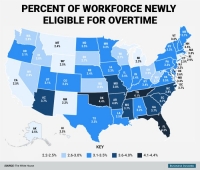Robby Soave, who had previously cheered on the Emergency Manager in Detroit and called for an agenda of “democracy isn’t worth saving — privatize it all,” as an alternative to the rule of “Kwame Kilpatrick, Monica Conyers, or some other crime lord” (“In Detroit, Democracy Isn’t Worth Saving—Privatize It All,” July 31, 2014), is arguing in the aftermath of the Flint water crisis that it was entirely the work of “government” rather than austerity or privatization (“The Government Poisoned Flint’s Water—So Stop Blaming Everyone Else,” Jan. 21).
He manages to indict government while exempting neoliberal government policy agendas as such from any of the opprobium associated with government. By “government,” he means a very select and limited part of government: Flint’s locally elected crime lords, in the mould of Kilpatrick and Conyers. He strenuously denies that the category of government crime lords includes Snyder or his Emergency Manager (in fact Soave’s article includes a flat-out assertion that Snyder didn’t make the decision, suggesting privileged access to the 2013 emails that nobody else has seen).
But at most the Flint City Council and Mayor had the power to propose, not to dispose — the water supply switchover had to be signed off on by Snyder’s Emergency Manager, with the permission of the Treasurer (and Snyder’s behind-the-scenes approval as well). Despite Soave’s disingenuous claim that “[t]he emergency manager… says the decision was made by the city long before his appointment,” the actual link he provides says something vastly different. The person he misleadingly refers to simply as “the emergency manager,” Darnell Earley, would more accurately have been described as “an emergency manager.” He was actually only one in a series of Emergency Managers appointed over Flint. In fact Earley’s predecessor, Emergency Manager Ed Kurtz, signed off on the proposal. All Earley did was oversee the implementation of his predecessor’s decision — and toast the switchover in a public ceremony. Although the City Council started the ball rolling, its vote was without effect without Emergency Manager approval. And the record shows ongoing involvement in the decision-making process by all the successive Emergency Managers in Flint. You might almost suspect Soave of counting on his readers not to check his source against his distorted summary for themselves. The fact that Snyder released his Flint-related emails only for 2014 and 2015, and not for 2013 (when the decision was made), also suggest more involvement than some people might like to admit.
Further, Soave makes it clear that the real fault lies, not with neoliberal austerity policies as such, but with — wait for it — those wicked public employee unions, for making Detroit water so darned costly. Flint had no choice but to switch its water source — the unions made them do it: “let’s not forget the reason why local authorities felt the need to find a cheaper water source: Flint is broke and its desperately poor citizens can’t afford higher taxes to pay the pensions of city government retirees.”
Only as it turned out, Soave’s “cheaper water” cover story falls apart. Detroit was actually offering water cheaper. Shortly after Soave’s attempt at a face-saving explanation, it emerged that Detroit Water and Sewage Department offered a deal far cheaper for local ratepayers than anything the Karengonda Water Authority could offer. Far from switching over to “save money,” Snyder and the Emergency Manager were obsessively promoting the KWA project to the point that they were willing to charge ratepayers more. And not only that, they were willing to switch over before the KWA had even completed its new Lake Huron pipeline and water treatment plant, and rely on water of questionable quality from the Flint River in the interim. At any rate, it stretches credulity to imagine that Snyder or anyone in his chain of command had any pristine “free market” motivations, given that his chief of staff at the time, Dennis Muchmore, was a Nestle lobbyist and Muchmore’s wife was Nestle’s public spokesperson. That’s right — Snyder’s administration is infiltrated at the very highest levels by corporate interests whose business model depends on enclosure and subsidized extraction of the water commons.
Shikha Dalmia comes in with her own rival target for blame (“The Flint Water Crisis Is the Result of a Stimulus Project Gone Wrong,” Jan. 25): The Flint water crisis really happened because of “a stimulus project gone wrong,” you see! The problem is that her story directly contradicts Soave’s. In the face of his discomfiture she’s willing to make a tactical retreat and regroup, and accept the fact that the Emergency Managers passed up a deal to pay less. Snyder, the Emergency Managers and the local government all saw the KWA’s development of its own independent treatment plant for Flint as a way of stimulating local economic growth.
So Snyder and everybody on down the chain of command were really willing to pay a higher rate to the KWA out of an ideological commitment to building out its infrastructure as a local economic stimulus project — it wasn’t really “privatization” or “austerity” at all!
Never mind the possibility that Snyder’s promotion of the KWA on the DWSD’s old turf, and the Detroit Emergency Manager’s splitting of the DWSD into two new entities, might reflect a policy of fragmenting the DWSD and opening all the individual parts up to privatization deals overseen by the Emergency Managers (perish the thought!) Never mind rumors that Snyder also envisioned piping in water from Lake Huron to service fracking operations.
No, let’s stick to Dalmia’s unjustifiable dichotomy between neoliberalism, austerity and privatization, on the one hand, and all that sleazy economic stimulus and other “crony capitalism” on the other. Question: What real-world government privatization or “market reform” agenda has ever not involved government-corporate collusion, or had as its primary end the public subsidization of private profit? Ever?
Unlike Soave, Dalmia is also a little more open to the possibility that Snyder and his Emergency Managers might have been involved in the decision — but it was really the lure of economic stimulus that led them astray from their previously pure agenda of “free market reform” and “privatization.” The devil made them do it.
Dalmia misses the point. If her argument about the inherent corruptness of all government as the cause of the Flint disaster proves anything, it proves too much. It’s a weapon that turns on the one wielding it.
Dalmia’s argument about the corruption of government applies equally to her own body of writings at Reason, in which she repeatedly equates this or that neoliberal government policy to “free market reform” or “free trade.” For all her talk of getting government out of things altogether, she’s waxed enthusiastic about school system policies to privatize schools’ food, busing and custodial services as a way of bypassing union bargaining power. She’s also strongly endorsed the protectionist, mercantilist regulatory regimes under NAFTA and TPP as “free trade,” as well as so-called “right-to-work” regulations by which legislatures insert themselves into the collective-bargaining process and override privately negotiated labor contracts. In fact Dalmia in one place (“Shikha Dalmia: The Next Battleground in the State Labor Wars,” WSJ, Sept. 30, 2012) denounces a ballot initiative to strike down wage and hours regulatory statutes that interfered with the terms of labor contracts as “a breathtaking power grab that would turn unions into a super legislature” — language one one would normally associate with lamentations about lese majeste against “our government” at Daily Kos or HuffPo.
Dalmia never makes it clear just how a neoliberal government “market reform” policy can ever be carried out except through government, or how governments can ever carry out such privatization and deregulation policies without falling victim to the same cronyism and insider politics as the Flint water deal. It seems she has a set of portable goalposts, where neoliberal government “reforms” like privatization, NAFTA, TPP and right-to-work laws are good — until somebody inevitably gets caught with their hand in the till, at which time it ceases to count any more as a “market reform” because the government’s doing it.
But let’s get something straight: Snyder and his Emergency Managers never had any “pure intentions” to be led away from. “Crony capitalism” and crooked “public-private partnerships” are what neoliberal privatization regimes like Snyder’s Emergency Managers are all about. More than that, they’re what any kind of state-driven “free market reform” lobbied for by the Kochs and their ilk is about. There’s no kind of government “market reform” policy except for the “crony capitalist” kind.
The state, by its very nature, is the executive committee of an economic ruling class. Any time a government policy-maker, no matter how much they talk about “free enterprise” and the “private sector,” pursues a “privatization” regime, you can bet your bottom dollar it’s really a corrupt deal between business and government to guarantee monopoly profits at the expense of consumers, taxpayers or both. And you can likewise bet that when a corporation negotiates a “privatization” deal with a government, it’s got nothing to do with “free markets.” It’s about reaping where they didn’t sow; it’s about acquiring an infrastructure built at public expense at sweetheart prices, through collusion with government, so they can loot and asset-strip it.
Simply put, there’s no way Dalmia can consistently apply her “it was government’s fault” analysis of the Flint disaster without also disavowing the entire range of “free trade,” “privatization” and “free market” reform policies — government policies — that she and like-minded people at Reason have endorsed over the years.
If you start with a natural resource commons, with an infrastructure developed at the expense of the user community itself, the question of whether to hand it over to administration by a featherbedding state bureaucracy or by a politically connected corporation isn’t a choice between two genuine alternatives. It’s just two variations on the same theme: expropriation, enclosure and tribute.
The relationship between government and corporate entities, in the life cycle of public utilities infrastructure, is a symbiotic one. As I described it in an earlier article about the corporate privatization of water in Detroit:
First, a basic infrastructure is created at taxpayer expense, either funded directly by taxpayer revenues or by bonds that will be repaid by the taxpayers. When it’s a country outside the US — especially a Third World country — foreign aid or World Bank loans may also help fund the project.
The infrastructure’s main purpose is usually to provide below-cost water or electric utilities, transportation, etc., to big business interests. In the Third World, that means foreign aid and World Bank loans to build the local power, water and transportation infrastructure needed to make Western capital investments (like offshored production) profitable. In California, the whole corporate agribusiness sector depends on massively subsidized water from government-funded dams. And… large-scale business and industrial water consumers in Detroit have received preferential treatment like forbearance on tens of thousands of dollars in past-due water bills, while ordinary household ratepayers in poor neighborhoods are treated without mercy.
Second, Disaster Capitalists (to use Naomi Klein’s term) seize on opportunities presented by US-sponsored coups (like Pinochet and Yeltsin), economic meltdowns (the European periphery and Detroit) and military regime change (the US invasion of Iraq) to coerce governments into selling off that debt-financed infrastructure to global capital. And the Disaster Capitalist toolkit includes using such debt (either to bondholders or to foreign lenders), and fiscal insolvency from debt, in exactly the same way as debt peonage or debt to a company store — to blackmail government entities into “privatizing” their infrastructure to “private” (but politically connected) corporations or to domestic kleptocrats. The purchase price is a sweetheart deal, pennies on the dollar, because of the purchasing corporations’ insider ties to the political authorities selling off the goods.
Third, governments frequently spend more in capital investments to make the “privatized” infrastructure salable than they realize from the sale of it.
Fourth, the first item on the agenda of the corporation acquiring the newly “privatized” infrastructure is typically asset-stripping — jacking up rates, using the revenues as a cash cow, and simultaneously starving it of needed maintenance expenditures. The asset-stripping frequently yields more in returns, in a short time, than the company paid for the infrastructure.
And fifth — as Nicholas Hildyard pointed out in “The Myth of the Minimalist State: Free Market Ambiguities” (Corner House Briefing 05, March 1998) — far from operating as a “free market” actor, the newly “privatized” utility or other infrastructure usually operates within a web of state subsidies and protections that more or less guarantee it a profit.
Yet the practical outcome of these policies has not, in most cases, been to diminish either the state’s institutional power or its spending. Instead, it has redirected them elsewhere. It has also strengthened the power of many Northern nations to intervene in the economic affairs of other countries, notably the indebted countries of the South, the emerging economies of the former Soviet Union, and the weaker industrialised partners of trade blocs such as the European Union….
Far from doing away with state bureaucracy, free market [sic] policies have in fact reorganised it. While the privatisation of state industries and assets has certainly cut down the direct involvement of the state in the production and distribution of many goods and services, the process has been accompanied by new state regulations, subsidies and institutions aimed at introducing and entrenching a “favourable environment” for the newly-privatised industries.
Anarchist Colin Ward, in his large body of work on the history of social services, has a similar framework. For Ward, the first step is the development of a natural resource commons (like water) or a public service infrastructure (schools, healthcare, housing) as a self-organized, cooperative effort by the user community themselves: working class health insurance mutuals and sick benefit societies, cooperative hospitals and schools, and the like. E.P. Thompson’s Making of the English Working Class and Kropotkin’s Mutual Aid are full of examples. The next step is for the self-aggrandizing state, whether under a right-winger like Bismarck or under Old Left types like Lenin and Harold Wilson, to nationalize the working class’s own self-organized institutions, and gradually eviscerate their human capital under bureaucratic management. The final step is to sell the state bureaucracy off to a politically connected corporation at collusive prices, or contract the bureaucracy’s functions off to a corporation at taxpayer expense.
That’s what real-world privatization, as carried out by any party that’s likely to hold power, always amounts to. Always. Put not your faith in princes.
Link to original article from Center for a Stateless Society













































































































































































 Imagine going to the polls on Election Day and discovering that your ballot could be collected and reviewed by the
Imagine going to the polls on Election Day and discovering that your ballot could be collected and reviewed by the On a night of Democratic victories, one of the most significant wins came in Virginia, where the party held onto
On a night of Democratic victories, one of the most significant wins came in Virginia, where the party held onto A seismic political battle that could send shockwaves all the way to the White House was launched last week in
A seismic political battle that could send shockwaves all the way to the White House was launched last week in In an interview with Reuters conducted a month after he took office, Donald Trump asserted that the U.S. had “fallen
In an interview with Reuters conducted a month after he took office, Donald Trump asserted that the U.S. had “fallen